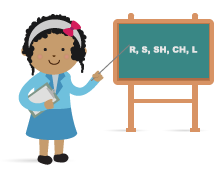
Stuttering occurs when speech is disrupted by involuntary repetitions, prolonging of sounds and hesitation or pausing before speech. Stuttering can be developmental, meaning it begins during early speech acquisition, or acquired due to brain trauma.
No one knows the exact causes of stuttering in a child. It is considered to have a genetic basis, but the direct link has not yet been found. Children with relatives who stutter are 3 times as likely to develop stuttering. Stuttering is also more typical in children who have congenital disorders like cerebral palsy.
A child who stutters is typically not struggling with the actual production of the sounds—stress and a nervousness trigger many cases of stuttering. Stuttering is variable, meaning if the speaker does not feel anxious when speaking, the stuttering may not affect their speech.
There are many notable stutters from throughout history including King George VI (subject of the film The King's Speech), the talented voice actor, James Earl Jones, and Edward VI (King of England during World War 2)
Stuttering typically begins after a child has started to use language, so it is not typically diagnosed until the child is 1 ½ to 2 years old or older. Generally, there are three symptoms of stuttering: repetition of a sound or syllable ("I be- be- be- be- believe"), a prolongation of a sound ("My name is Mmmmmmmmmike") or a speech block occurs hindering movement of tongues or lips.
People who stutter may find that the stuttering is variable given the social situation they encounter. If a child is not nervous around close friends or family or talking on the phone, her stutter may not be apparent. On the other hand, if he is about to give a speech in public, his stuttering may become such a problem that he cannot continue speaking.
If you think your child has a stutter, it is best to seek the help of a professional speech therapist. There are many techniques therapists use to work with children. Stuttering modification therapy does not eliminate stuttering, but modifies it so that speech is easier and the stutter isn’t as apparent. Fluency shaping therapy teaches voice lessons by moderating “breathing, phonation, and articulation” and slowing down the speaking rate.
Parents may be able to help their child diminish her stutter. By reading together, preparing visual cues for a child, and giving positive feedback whenever possible, a child's speaking anxiety may diminish which will help reduce the frequency and severity of stuttering.
Speech Buddies do not help correct stuttering.
Articulation Disorder, Apraxia of Speech, Autism, Cerebral Palsy, Cleft Palate, Down syndrome, Fragile X Syndrome, Language Disorder, Speech Delay
References:
http://www.speechbuddy.com/blog/speech-disorders-2/darth-vaders-stutter/
http://www.speechbuddy.com/blog/speech-therapy-techniques/using-the-phone-for-stutterers/

Please contact us for immediate help with your request.
![]() 1-866-247-8030
1-866-247-8030
![]() info@speechbuddies.com
info@speechbuddies.com
Outside of business hours? You will be contacted as soon as we are open.
To choose a new speech therapist, please contact us.
![]() 1-866-247-8030
1-866-247-8030
![]() info@speechbuddies.com
info@speechbuddies.com
Outside of business hours? You will be contacted as soon as we are open.
You can reschedule your appointments anytime. We ask that you give us at least 24 hours notice to avoid any unnecessary fees or complications. You will not be charged for any of your sessions until the day of that appointment.
Your speech therapist likely gave you a recommended treatment plan in your first session. If not, make your best guess – you can always modify your package later.
Your message has been sent. or close this window to continue.
Your discount code will be sent to your email shortly.
 I am a parent
I am a parent
 I am a Speech Therapist
I am a Speech Therapist